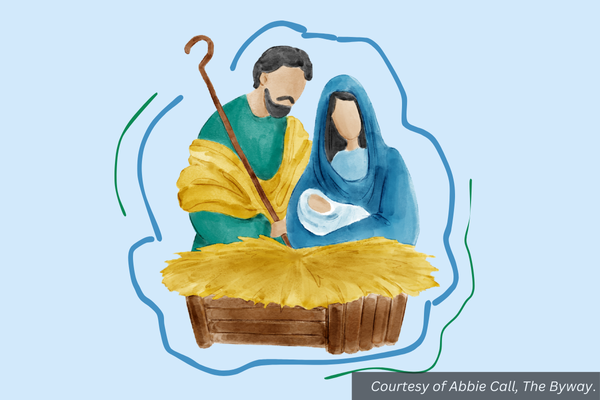Years ago I attended a tree festival in a government building. The trees were beautifully decorated with sports themes, Disney themes, et cetera — everything but Nativity themes. I wrote a letter to the city council inquiring why that was the case. They responded that it was illegal to show any religious preference in a government facility. Hmmm. We’re celebrating the birth of the Savior, but he is not invited to his own party.
If I did not know Jesus and was taking my cues from society on when, how, and why to celebrate Christmas, I might get confused.
Even after setting aside the problems of a secular Christmas, there is still much mystery about the actual Christmas — including uncertainty about what time of year Jesus Christ was born. Biblical scholars cannot agree on this question, and even the Latter-day Saint tradition of placing Christ’s birth in the spring — is not actually specified in scripture, ancient or modern.
When to Celebrate Christmas
So when was Jesus born?
Two historical events indicate wintertime may have been unlikely. First, at the time of Christ’s birth, Caesar Augustus ordered all the inhabitants of the earth to be registered, possibly for military conscription and taxation purposes. Making his citizens travel in winter is questionable.
Secondly, the shepherds were outside watching their flocks by night. Shepherds tended their flocks during the lambing season in the spring. Flocks lived in the open air from late March through November. Had it been winter, the flocks would have been under cover, not in the fields.
For a century, many members of the Church of Jesus Christ of Latter-day Saints have believed Jesus was born on April 6 based on James E. Talmage’s interpretation explained in his book, Jesus the Christ. But Talmage had drawn the April 6 conclusion based on the section heading of Doctrine & Covenants Section 20, which heading was later found to be penned by church historian John Whitmer rather than the prophet Joseph Smith. In other words, Talmage’s source was not part of the D&C 20 revelation — it was simply an introductory heading of that revelation.
Jeffrey R. Chadwick, an associate professor of church history at BYU, published an article addressing this question in the 2010 BYU Studies. In his article, “Dating the Birth of Jesus Christ,” Chadwick outlines his research on the Annunciation of Mary recorded in Luke (plus nine months), Jesus’s circumcision at eight days of age, the visit of the wise men from the East, the historical death date of King Herod the Great (who ordered the killing of all male infants in Bethlehem) and the timing of Jesus’s death.
“When all is said and done,” Chadwick wrote, “the facts from the New Testament, the Book of Mormon, and the history of Josephus, combined with input from archaeological and astronomical research, all point to a day in December of 5 B.C. for the date of Jesus’ birth … (H)is birth occurred within those December weeks that we now commonly refer to as the Christmas season.”
It is also possible December 25 was originally chosen as a political move, an effort by Roman leaders to unify pagans and Christians by combining holidays: the birth of the Savior and the Roman pagan festival marking the winter solstice.
Of course, the timing of Jesus’ birth isn’t as important as what He did for humankind. Because I know Jesus, I celebrate him daily, weekly, monthly, and annually at Christmastime. I don’t think he cares when I celebrate, just that I do.
How to Celebrate
Financially, Christmas is a substantial economic booster. Marketing, commercialization, and materialism have replaced what once was considered holy, humble, and lowly.
Americans spend an average of $1,000 each Christmas, so it is a major budget item in nearly every household. Of that $1,000, about 20% is on non-gift items such as Christmas sweaters, travel, and decorations. For the average American, $1,000 is roughly a week’s income.
Many use this season as a time to express appreciation for family, friends, and co-workers through gift-giving. It can also be a time of gathering with loved ones for parties and festive meals. Approximately 115 million Americans travel over the holidays.
Holidays used to be called Holy Days; hence, a celebration usually revolved around some sort of religious festivity. Christmas was traditionally a time to celebrate the birth of the Savior, no matter when that event actually occurred. That isn’t so true anymore. Both Santa and Jesus are associated with Christmas, with Jesus viewed as the spiritual reason, and Santa focused on the gift-giving and festive aspects.
Because I know Jesus, I celebrate him through remembering him, keeping his commandments, and serving others as He does.
Why to Celebrate
Many people are so stressed by all the preparations they can’t relax and enjoy themselves. So why celebrate? Indeed, why?
The date on the calendar is not definitive; the holy days have morphed into more festivity than worship, and the effort is sometimes not rewarding.
I suggest pausing to consider why you do what you do during the holidays. Is it necessary? Is it rewarding? Does it fulfill your specific purpose for having Christmas?
Because I know Jesus, I recognize Him as my Savior. I am eternally grateful and indebted to Him for his sacrifice and love for me. That is my why.
In a season we invest heavily in with time and money, consider what you do know and why you do what you do. May it be a satisfying time of creating good memories, filled with what you determine to be your purpose for celebrating Christmas.
– by Karen Munson
Read how to celebrate Christmas spirt all year in Joslyn Frandsen’s The True Meaning of Christmas.
Read more from Karen in her editorial on New Year’s, Way Leads On to Way.

Karen M. Munson – Escalante
Karen is an associate editor at The Byway. She is fascinated and fulfilled by all things involved with writing. After graduating from BYU, she taught English at Escalante High School for three years. She pursues opportunities to write and support others in their writing. Karen has published three books with four more scheduled to be released in 2024. She and Reed are the parents of ten children and the grandparents of 35 grandchildren.
Karen is the author of the New Twist on Mental Health column in The Byway.

